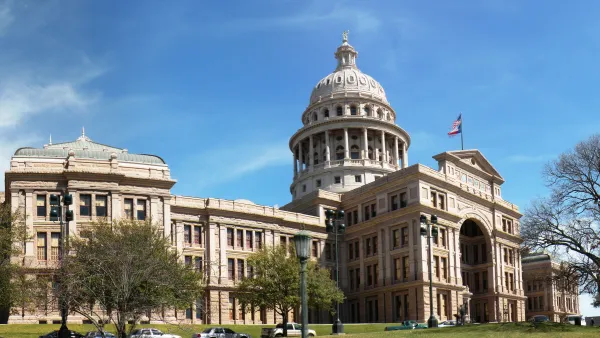Following-up on the depavement of 83 miles of "farm-to-market" roads, TxDOT now proposes a much larger budget-saving measure: "Turn back" control of 2,000 miles of these state roadways to counties and cities. TxDOT also wants to focus on urban roads.
Gail Delaughter explains the two major reasons for what is being called the "turnback" proposal. She also broadcasts her story on an accompanying 2:32 audio tape.
- Budgetary: Texas Department of Transportation (TxDOT) had requested "about $4 billion for future transportation needs" during the legislative sessions. As we posted here on August 12, a measure did pass to allow voters to decide next year "whether or not to divert about $1.2 billion of oil and gas revenues from the state’s Rainy Day Fund to the state's highway fund". Lacking sufficient revenue to maintain all of its 80,000 roads, the aim is to reduce the road burden by letting "local governments start footing the bill for things like resurfacing and pothole repair", Delaughter writes.
- Urban Focus: Delaughter reports that Texas Transportation Commissioner Jeff Moseley "says the money that now goes to local road maintenance could be better used for other projects, like increasing capacity on the state's congested freeways."
"We have 1,200 new Texans every day moving into our state. Many of these families are bringing two automobiles, and about 85% of those are coming into the urban areas of Texas, including Houston."
The five-member Texas Transportation Commission oversees statewide activities of TxDOT. It would seem that in addition to rural vs. urban, the choice the commission is considering is one of congestion mitigation over maintenance - a choice we questioned here last year.
Texas roads crisis Part 1 dealt with the proposal to convert 83 miles of farm-to-market, asphalt roads to gravel, partly in response to the significant toll that heavy trucks servicing the energy industry makes on these roads. No mention was made by Gail Delaughter of the road damage caused by these trucks, making it clear that that TxDOT's budgetary crisis goes beyond road damage caused by the state's booming energy industry.
These painful budgetary measures were forewarned by state Sen. Kevin Eltife (R-Tyler) when he proposed adding 10-cents to the 20-cent state gas tax, wrote Tom Benning of the Dallas Morning News on February 18.
Until we have the political courage to really find the robust, long-sustaining revenue, we’re going to damage to our state’s infrastructure and to this industry,” he said.
FULL STORY: Local Officials Concerned Over TxDOT Money-Saving Proposal

Analysis: Cybertruck Fatality Rate Far Exceeds That of Ford Pinto
The Tesla Cybertruck was recalled seven times last year.

National Parks Layoffs Will Cause Communities to Lose Billions
Thousands of essential park workers were laid off this week, just before the busy spring break season.

Retro-silient?: America’s First “Eco-burb,” The Woodlands Turns 50
A master-planned community north of Houston offers lessons on green infrastructure and resilient design, but falls short of its founder’s lofty affordability and walkability goals.

Test News Post 1
This is a summary

Analysis: Cybertruck Fatality Rate Far Exceeds That of Ford Pinto
The Tesla Cybertruck was recalled seven times last year.

Test News Headline 46
Test for the image on the front page.
Urban Design for Planners 1: Software Tools
This six-course series explores essential urban design concepts using open source software and equips planners with the tools they need to participate fully in the urban design process.
Planning for Universal Design
Learn the tools for implementing Universal Design in planning regulations.
EMC Planning Group, Inc.
Planetizen
Planetizen
Mpact (formerly Rail~Volution)
Great Falls Development Authority, Inc.
HUDs Office of Policy Development and Research
NYU Wagner Graduate School of Public Service


























